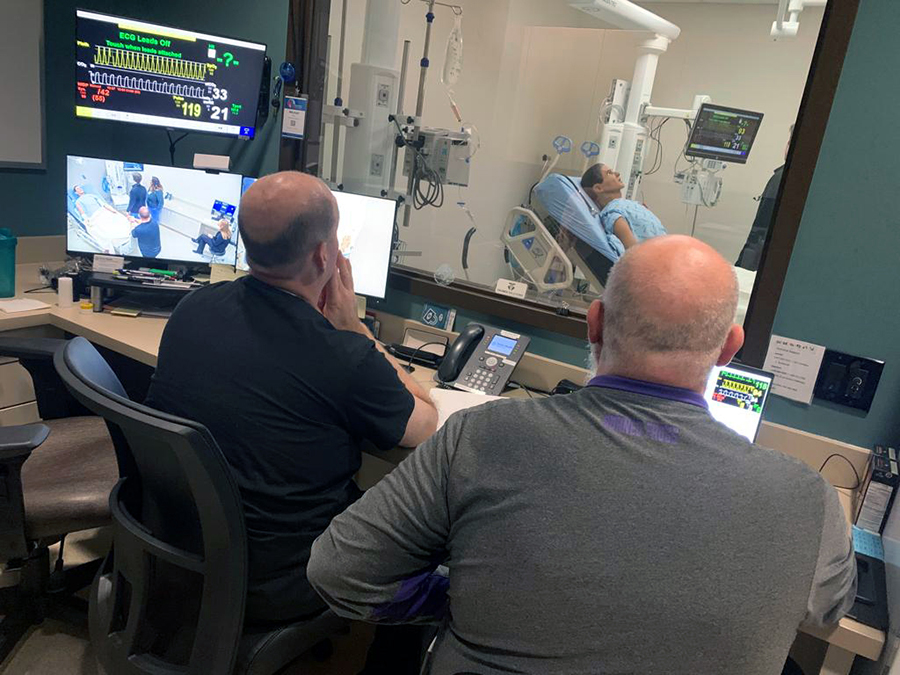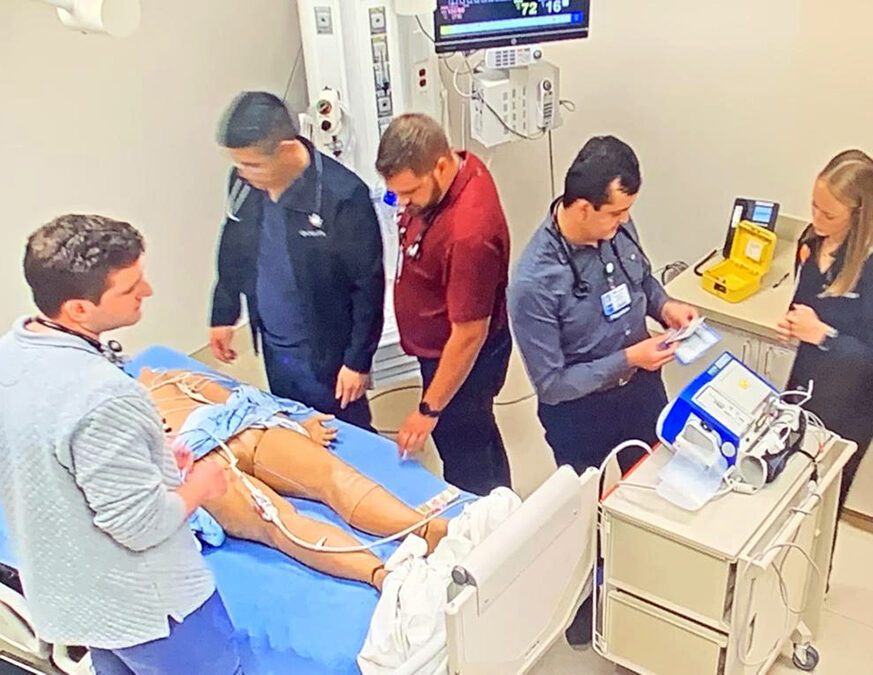
Medical simulations allow health care professionals to practice and hone skills in a low-risk environment, enabling them to better handle real-life emergencies.
Medical simulation has come a long way in recent years, providing a safe and controlled environment in which health care professionals can practice and improve their skills.1 Gone are the days of simple mannequin simulations. Today’s medical simulations are highly realistic and interactive, using advanced technology such as virtual reality and high-fidelity mannequins that can mimic real human physiology including bleeding and crying.
Medical simulations allow health care professionals to practice and hone their skills in a low-risk environment, making them better prepared to handle real-life medical emergencies. They are also a great way to test and evaluate new protocols and procedures before implementing them in a real-life setting.
Escape rooms have become a popular form of entertainment in recent years, challenging players to solve puzzles and riddles to “escape” a themed room. But did you know that escape rooms can also be a valuable tool in medical education? Escape-room-style medical simulations are becoming increasingly popular in medical schools and hospitals as a training tool, and for good reason.2 Not only are they a fun and engaging way to learn, but they also provide a safe, controlled environment for team-building exercises and improving clinical skills.
At Texas Health Harris Methodist in Fort Worth, Texas, we designed and implemented escape-room-style simulations to teach and test clinical skills in a high-stakes, time-sensitive environment.
In these simulations, internal-medicine residents are placed in simulated medical scenarios and must work together to diagnose and treat the patient, all while being timed and facing various challenges and obstacles. Working under pressure and in a high-stakes environment can help residents learn to think on their feet and make quick, accurate decisions.
The combination of escape-room-style simulations and traditional high-fidelity simulations at our facility is intended to facilitate learning using realism, reflection, practice, and feedback. A vast majority of medical errors occur due to a lack of communication and teamwork. Our overarching goal is to bring about improvements in patient-care safety2,3 and reduce medical errors after internal medicine residents practice critical skills in a controlled environment.
How it works
Our residents participate in these escape room sessions and are asked to complete a survey and knowledge assessment test before and after each session.4 The survey consists of Likert-scale and open-text-style questions that address the Accreditation Council for Graduate Medical Education (ACGME) core competencies including patient care, medical knowledge, professionalism, interpersonal and communication skills, practice-based learning and improvement, and system-based practice.
Pre-work for the escape room session is provided via email to the internal medicine residents one week before the session. Pre-work contains reading material including evidence-based review articles and current guidelines about the topics covered in the simulations. A pre-brief is given before beginning the simulation sessions. The pre-brief includes a description of the event and escape-room activities. Goals, objectives, roles, and responsibilities are discussed during the pre-brief.
Each escape-room session is followed by a post-brief that includes a review of the event and the effectiveness of the simulation session. During the post-brief, residents identify challenges and unexpected events and discuss areas for improvement based on the outcomes of the simulation.
Board-style questions relevant to the escape-room scenarios (from The Medical Knowledge Self-Assessment Program developed by the American College of Physicians)4 were used for pre-and post-tests to assess improvement in knowledge and understanding of a specific medical topic acquired during these sessions. All internal medicine residents agreed that the questions asked were appropriate for the setting. This testing was used to evaluate the effectiveness of our sessions and determine if the physician gained new knowledge and skills.
Rating our success
Our objective was to shorten learning curves and improve competency.5 Based on our Likert survey, which was used to assess residents’ knowledge, skills, and behavior, 90% of the residents felt they learned from their peers during simulation sessions. Most residents said they would recommend this activity to others. All residents had participated in traditional simulation sessions during medical school, however, none of them had participated in escape rooms during simulation sessions.

The combination of escape-room and traditional simulations at Texas Health Harris Methodist improves patient care.
Our survey also showed that 81% of residents preferred visual or kinesthetic tools for learning, and 92% of residents identified that simulation scenarios were able to successfully test their ability to communicate effectively as a team. Most of the residents felt that escape rooms on critical-care scenarios helped them identify knowledge gaps, and 81% of residents strongly agreed that escape rooms appropriately reinforced their knowledge and were an appropriate medium for teaching new information.
Simulation is a valuable tool to help trainees acquire the skills to provide high-value care. Team-based learning is evidence-based and multiphasic and requires active engagement and participation of the learner. These sessions encourage interprofessional learning and emphasize team-based learning to learn core concepts related to patient safety.6
Escape-room-style medical simulations are also a great way to foster teamwork and communication. In a real-life medical emergency, it’s essential for health care professionals to work together and communicate effectively to provide the best possible care for the patient.
While the Institute of Medicine recognizes that patient care is a “team sport,” medical training still focuses on individual performance. Integration of simulation can help prepare residents to function as a team in complex situations. Escape rooms can be used as a tool to assess trainees’ competency and knowledge, and they can help identify areas that need improvement.
Several scales can be used to assess the effectiveness of simulations for medical residents. One commonly used scale, the Objective Structured Clinical Examination, can help assess communication and interpersonal skills. It provides a standardized, objective assessment of clinical skills. Global rating scales have also been used as assessment tools in different specialties. One study used scenario-specific checklist items based on individual milestones for emergency-medicine residents, chosen and reviewed by experienced emergency-medicine physicians.7
Medical simulation is an essential part of modern health care and will continue to play a vital role in the training and development of health care professionals. Integrating escape rooms and traditional high-fidelity simulations has the potential to enhance learning while achieving ACGME competencies. Overall, escape-room-style medical simulation is a valuable addition to medical education, providing a unique and engaging way to teach and test clinical skills.

Dr. Puri
Dr. Puri is a hospitalist and the director of quality and scholarly activity for the internal medicine residency program at Texas Health Fort Worth Harris Methodist Hospital in Fort Worth, Texas.
References
- Hamman WR, et al. Simulation for the training of human performance and technical skills: the intersection of how we will train health care professionals in the future. J Grad Med Educ. 2009;1(2):245-52.
- Wu C, et al. Promoting leadership and teamwork development through Escape Rooms. Med Educ. 2018;52(5):561-2.
- Goolsarran N, et al. Effectiveness of an interprofessional patient safety team-based learning simulation experience on healthcare professional trainees. BMC Med Educ. 2018;18(1):192.
- American College of Physicians. MKSAP: Medical Knowledge Self-Assessment Program VIII. https://www.acponline.org/featured-products/mksap-19. Accessed January 9, 2023.
- Davis K, et al. Twelve tips for creating an escape room activity for medical education. Med Teach. 2022;44(4):366-71.
- Diemer G, et al. Patient Safety Escape Room: A Graduate Medical Education Simulation for Event Reporting. MedEdPORTAL. 2019;15:10868. doi: 10.15766/mep_2374-8265.10868.
- Hart D, et al. Simulation for assessment of milestones in emergency medicine residents. Acad Emerg Med. 2018;25(2):205-20.